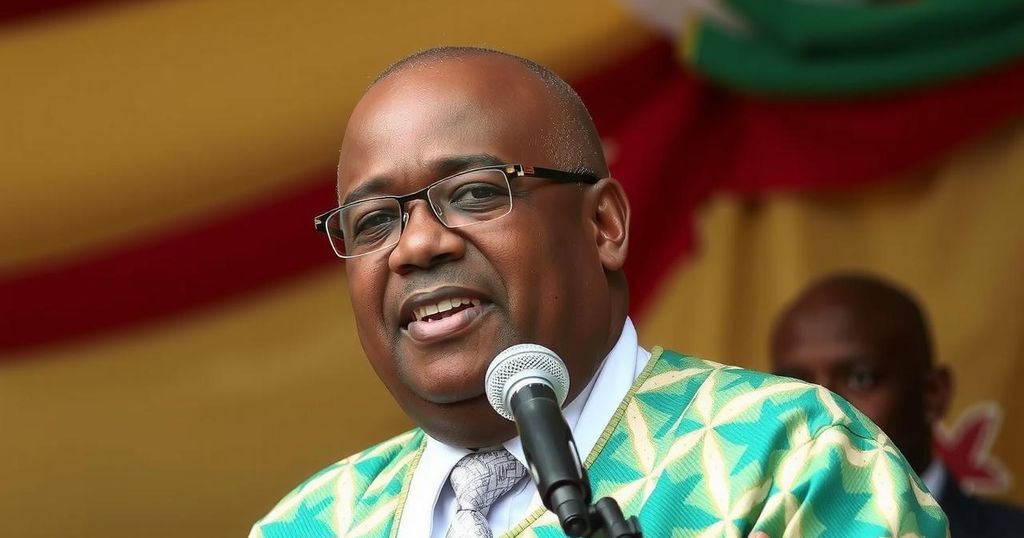John Mahama Secures Presidential Victory in Ghana’s Election

Ghana’s opposition leader, John Mahama, has emerged victorious in the presidential election, securing 56% of the vote against Vice President Mahamudu Bawumia’s 41%. Mahama’s return to power follows dissatisfaction with the ruling party’s economic management, culminating in high inflation and an IMF bailout. His victory promises reforms aimed at economic recovery amid challenging fiscal conditions, with Mahama emphasizing the need to respond to the public’s aspirations.
In a significant political development, John Mahama, leader of Ghana’s opposition, has been declared the definitive winner of the presidential election held on Saturday, securing 56 percent of the votes. His victory over the incumbent ruling party candidate, Vice President Mahamudu Bawumia, who garnered 41 percent, reflects the voters’ dissatisfaction with the government’s economic management and rising living costs. The election results herald Mahama’s return to power, putting an end to eight years of rule by the New Patriotic Party (NPP) and President Nana Akufo-Addo, whose administration faced severe economic challenges, including an IMF bailout and a debt crisis.
Celebrations erupted among supporters as Mahama addressed his audience, stating, “These eight years have witnessed some of the darkest periods of our governance.” He emphasized that this mandate serves as a crucial reminder for leaders about the consequences of failing to address the aspirations of the populace. Notably, Bawumia swiftly acknowledged the election outcome, recognizing Ghanaians’ desire for change after years of economic frustration. In addition to securing the presidency, Mahama’s National Democratic Congress (NDC) party also appears to have won the parliamentary vote, although official results are yet to be fully confirmed.
At 66 years of age, Mahama’s electoral success comes after two previous failed attempts to reclaim the presidency. His campaign resonated with voters, highlighting a pressing demand for reform and economic recovery in Ghana. He has pledged to “reset” the nation, aiming to revitalize the economy and renegotiate components of the existing $3 billion IMF agreement. During his acceptance speech, Mahama committed to implementing significant reforms and rigorous measures to steer Ghana back on course. He expressed determination, stating, “The journey is not going to be easy” but expressed confidence that they would prevail in overcoming the challenges ahead.
This election occurs against a backdrop of economic hardships that have plagued Ghana, a leading gold producer and significant cocoa exporter. While the voter turnout stood at 60.9 percent, a decline from the previous election’s 79 percent, the economic turmoil evidently shaped the electorate’s decision-making process. Despite the NPP’s attempts to break from past criticism and pursue a third consecutive term, concerns surrounding inflated costs and financial instability ultimately underpinned the election’s outcome, facilitating Mahama’s political resurgence.
The political landscape of Ghana has been characterized by a dynamic interplay between its two major parties, the National Democratic Congress (NDC) and the New Patriotic Party (NPP), alternating power since the re-introduction of multi-party democracy in 1992. Following an economically challenging era under President Nana Akufo-Addo’s NPP, which witnessed a significant economic downturn, high inflation rates, and a resulting IMF bailout, the electorate’s discontent has accentuated calls for change. John Mahama’s previous political experience as both former Vice President and President provide him with a nuanced understanding of Ghana’s governance challenges, despite facing scrutiny from his earlier administration. Mahama’s recent electoral victory represents not only a critical shift in governance but also a response to the pressing financial realities faced by Ghanaians, thereby illuminating the importance of economic issues in democratic processes.
John Mahama’s decisive victory in Ghana’s presidential election signifies a profound shift in the nation’s political landscape, driven primarily by public discontent over economic hardships during the past eight years under the NPP. His commitment to reform, economic revitalization, and accountability resonates with the electorate’s aspirations for a more stable and prosperous future. As he prepares to lead the country, the challenges ahead remain significant, but Mahama’s emphasis on addressing the people’s needs positions him for potentially transformative governance.
Original Source: www.france24.com







